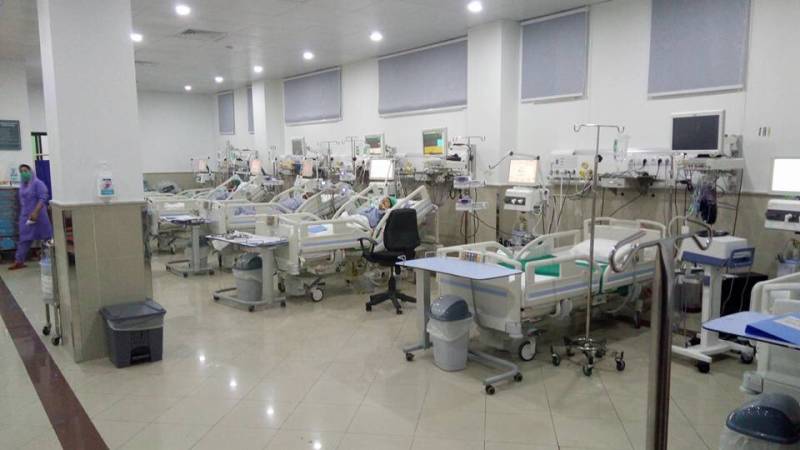
A group of volunteers from across Pakistan has come together to develop affordable solutions to combat COVID19. The volunteers comprise doctors, biomedical professionals, engineers, academics , diaspora, resource mobilizes, and other occupations. These Pakistani professionals aim at 3D printing and manufacturing ventilators, valves and required equipment for frontline response to Coronavirus.
The group has announced that the first 3D ventilator prototype will be ready for testing in 10 days.
In Pakistan ventilators are in short supply. Presently, there are only 2500 ventilators in the country. 1700 are available in the Punjab, 500-800 in Sindh, less than 50 in Baluchistan, and around 100 in KP province. PIMS which is the leading facility responsible for Islamabad and much of North has only a few ventilators. China is expected to provide 10,000 but that may not meet the demand, experts have warned.

The 3D printing process builds a three-dimensional object from a computer-aided design model (CAF) usually by successively adding material layer by layer, which is why it is also called additive manufacturing. The group is getting and seeking support from the nation to scale up the initiative for larger impact that requires resources and facilitation at different levels.
Dr. Bilal Siddiqui, PhD is leading the volunteers in this initiative. Bilal and other volunteers were concerned about the emerging challenge of the COVID19 pandemic, and its unprecedented critical stress on the healthcare system of Pakistan.
"We should plan for a caseload of 200,000 or so in 2 months time and 10-15% may need ventillators. Its going to be a battle of life and death for hundreds of patients and we don't know how long this will last", says Siddiqui.
Lack of medical equipment to cater to the needs of the patients is a major bottleneck. Medical equipment, which is affordable and optimized for conditions in Pakistan is totally missing. High costs, logisticals issues, manufacturing countries' inability to fulfill export demands due to their own local demands etc has made import of this equipment even more difficult.
The group is growing daily and has over 100 engineers, medical professionals, professors, entrepreneurs and resource mobilisers working tirelessly in various teams to produce various solutions rapidly. The group's active collaboration is currently focused on developing local design and engineering solutions to make available the following equipment: low-cost and massively available respiratory ventilators, portable oxygen supplies, face masks and protection screens, respiratory valves, viral media tubes, non-contact thermometers, retrofitting existing vents to serve multiple patients; and arranging 3d printing farms, manufacturing and funding support to deal with the COVID19 crisis situation.
Once the solutions are developed, tested and approved for medical use, then they will be deployed across the country. Arrangements are underway for making available the funds for mass manufacturing by connecting the idle 3D printer capacity as farms, and coordinating a manufacturing grid nationally.
"The cheapest ventillator from China is available for $800-1000. We will try to reverse engineer or make it less than this cost," adds Siddiqui. He is also appealing for voluntary contributions to get this initiative going.
The initiative is currently in the testing stage and its group members are in touch with the NDMA, hospitals, provincial governments and a large number of contributing organisations across the country.
The group has announced that the first 3D ventilator prototype will be ready for testing in 10 days.
In Pakistan ventilators are in short supply. Presently, there are only 2500 ventilators in the country. 1700 are available in the Punjab, 500-800 in Sindh, less than 50 in Baluchistan, and around 100 in KP province. PIMS which is the leading facility responsible for Islamabad and much of North has only a few ventilators. China is expected to provide 10,000 but that may not meet the demand, experts have warned.

The 3D printing process builds a three-dimensional object from a computer-aided design model (CAF) usually by successively adding material layer by layer, which is why it is also called additive manufacturing. The group is getting and seeking support from the nation to scale up the initiative for larger impact that requires resources and facilitation at different levels.
Dr. Bilal Siddiqui, PhD is leading the volunteers in this initiative. Bilal and other volunteers were concerned about the emerging challenge of the COVID19 pandemic, and its unprecedented critical stress on the healthcare system of Pakistan.
"We should plan for a caseload of 200,000 or so in 2 months time and 10-15% may need ventillators. Its going to be a battle of life and death for hundreds of patients and we don't know how long this will last", says Siddiqui.
Lack of medical equipment to cater to the needs of the patients is a major bottleneck. Medical equipment, which is affordable and optimized for conditions in Pakistan is totally missing. High costs, logisticals issues, manufacturing countries' inability to fulfill export demands due to their own local demands etc has made import of this equipment even more difficult.
The group is growing daily and has over 100 engineers, medical professionals, professors, entrepreneurs and resource mobilisers working tirelessly in various teams to produce various solutions rapidly. The group's active collaboration is currently focused on developing local design and engineering solutions to make available the following equipment: low-cost and massively available respiratory ventilators, portable oxygen supplies, face masks and protection screens, respiratory valves, viral media tubes, non-contact thermometers, retrofitting existing vents to serve multiple patients; and arranging 3d printing farms, manufacturing and funding support to deal with the COVID19 crisis situation.
Once the solutions are developed, tested and approved for medical use, then they will be deployed across the country. Arrangements are underway for making available the funds for mass manufacturing by connecting the idle 3D printer capacity as farms, and coordinating a manufacturing grid nationally.
"The cheapest ventillator from China is available for $800-1000. We will try to reverse engineer or make it less than this cost," adds Siddiqui. He is also appealing for voluntary contributions to get this initiative going.
The initiative is currently in the testing stage and its group members are in touch with the NDMA, hospitals, provincial governments and a large number of contributing organisations across the country.
